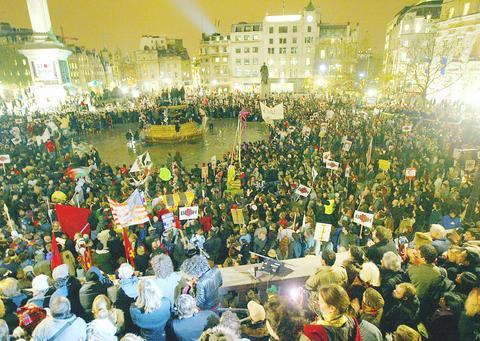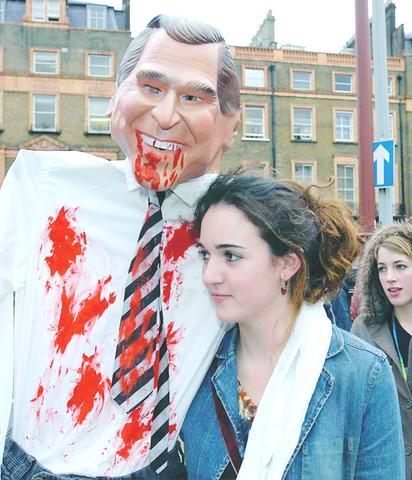Protesters came from every corner of Britain to vent their fury at US President George W. Bush, deriding him on their placards as everything from an empty-headed missile to a pretzel-munching chimp.
But police and protesters agreed that Thursday's massive march through London, though laced with anger towards Bush and his major ally British Prime Minister Tony Blair, was a model of peaceful behavior.
"We've had a very good-tempered march, and there have been no particular problems," said Deputy Assistant Commissioner Andy Trotter, who oversaw the Metropolitan Police's deployment of more than 5,100 officers along the parade route to Trafalgar Square.

PHOTO: AP
Police said they had arrested at least 67 people for a range of offenses including public disorder, drunkenness, writing graffiti and car crime during the president's three-day visit.
The Stop the War Coalition, which organized the main demonstration and several other smaller protests since Bush's arrival, claimed their efforts had forced the president to restrict his movements around London.
They concluded their show of force by knocking over a five-meter papier-mache statue of Bush, mocking the toppling of Saddam Hussein statues by US forces in Iraq.

PHOTO: AP
"We occupied central London for the day and put George Bush under house arrest," said the march's chief steward, Chris Nineham.
"He came to London hoping for a big welcome. Well, only two people welcomed him: Tony Blair and the queen," he said.
Bush and Blair said at a joint news conference they respected the protesters' rights, but suggested they were hypocritical.
"Freedom is beautiful," Bush said.
"All I know is that people in Baghdad weren't allowed to do this until recent history," he said.
Thursday's march and rally mobilized between 100,000 and 110,000 people, police said, with a particularly large showing from university students and veteran left-wing critics of Israel.
Many waved handwritten placards and banners with hostile messages for Bush that included the crudest of slurs.
"Choke on it, monkey-boy," said one placard that pictured a jug-eared Bush eating a pretzel.
"Bush off to hell Zionist dog," demanded another.
Some demonstrators proffered overtly anti-US and anti-Jewish messages, such as upside-down US flags covered in Nazi swastikas or Stars of David.
But the march's vanguard also featured a group of about 50 US citizens living abroad.
One of their banners read "Proud of my country, ashamed of my president."
"I just felt I had to protest against Bush's policies and not sit at home fuming," said Therese Munn, who before moving to London lived in Jersey City, New Jersey.
Munn said many of her American friends had lost jobs during the US' economic downturn or were struggling to pay medical bills.
"I don't understand how Bush can justify spending billions extra on defense when these more basic needs of employment and medical care aren't being met," she said.
Abdul Rastagan, an American whose Afghan parents fled Kabul in 1979 when the Soviets invaded, said many of his friends back in Laguna Hills, California and the University of California in Los Angeles "seem oblivious" to the international outrage at the US-British invasion of Iraq.
Rastagan, 27, who has worked for three years as a pharmaceutical chemist in the Swedish capital of Stockholm, flew specially to London to join his first protest against the occupation of Iraq.
He accused Bush of "exploiting our grief post-September 11 to pursue his own long-standing agenda in Iraq."
He said that many Europeans had also become unreasonably one-sided.
Rastagan also said he was "getting sick of having to defend my country every time somebody hears I'm an American."
"The anti-Americanism in Sweden is unbelievable. The Swedes won't listen to the other side of the argument, and the same thing's happening all over Europe," he said.
"It's amazing how one person, Bush, could throw away so much good international feeling towards America. Somehow he's managed to do it," he said.

ECONOMIC WORRIES: The ruling PAP faces voters amid concerns that the city-state faces the possibility of a recession and job losses amid Washington’s tariffs Singapore yesterday finalized contestants for its general election on Saturday next week, with the ruling People’s Action Party (PAP) fielding 32 new candidates in the biggest refresh of the party that has ruled the city-state since independence in 1965. The move follows a pledge by Singaporean Prime Minister Lawrence Wong (黃循財), who took office last year and assumed the PAP leadership, to “bring in new blood, new ideas and new energy” to steer the country of 6 million people. His latest shake-up beats that of predecessors Lee Hsien Loong (李顯龍) and Goh Chok Tong (吳作棟), who replaced 24 and 11 politicians respectively

Archeologists in Peru on Thursday said they found the 5,000-year-old remains of a noblewoman at the sacred city of Caral, revealing the important role played by women in the oldest center of civilization in the Americas. “What has been discovered corresponds to a woman who apparently had elevated status, an elite woman,” archeologist David Palomino said. The mummy was found in Aspero, a sacred site within the city of Caral that was a garbage dump for more than 30 years until becoming an archeological site in the 1990s. Palomino said the carefully preserved remains, dating to 3,000BC, contained skin, part of the

Russian hackers last year targeted a Dutch public facility in the first such an attack on the lowlands country’s infrastructure, its military intelligence services said on Monday. The Netherlands remained an “interesting target country” for Moscow due to its ongoing support for Ukraine, its Hague-based international organizations, high-tech industries and harbors such as Rotterdam, the Dutch Military Intelligence and Security Service (MIVD) said in its yearly report. Last year, the MIVD “saw a Russian hacker group carry out a cyberattack against the digital control system of a public facility in the Netherlands,” MIVD Director Vice Admiral Peter Reesink said in the 52-page

‘WATER WARFARE’: A Pakistani official called India’s suspension of a 65-year-old treaty on the sharing of waters from the Indus River ‘a cowardly, illegal move’ Pakistan yesterday canceled visas for Indian nationals, closed its airspace for all Indian-owned or operated airlines, and suspended all trade with India, including to and from any third country. The retaliatory measures follow India’s decision to suspend visas for Pakistani nationals in the aftermath of a deadly attack by shooters in Kashmir that killed 26 people, mostly tourists. The rare attack on civilians shocked and outraged India and prompted calls for action against their country’s archenemy, Pakistan. New Delhi did not publicly produce evidence connecting the attack to its neighbor, but said it had “cross-border” links to Pakistan. Pakistan denied any connection to